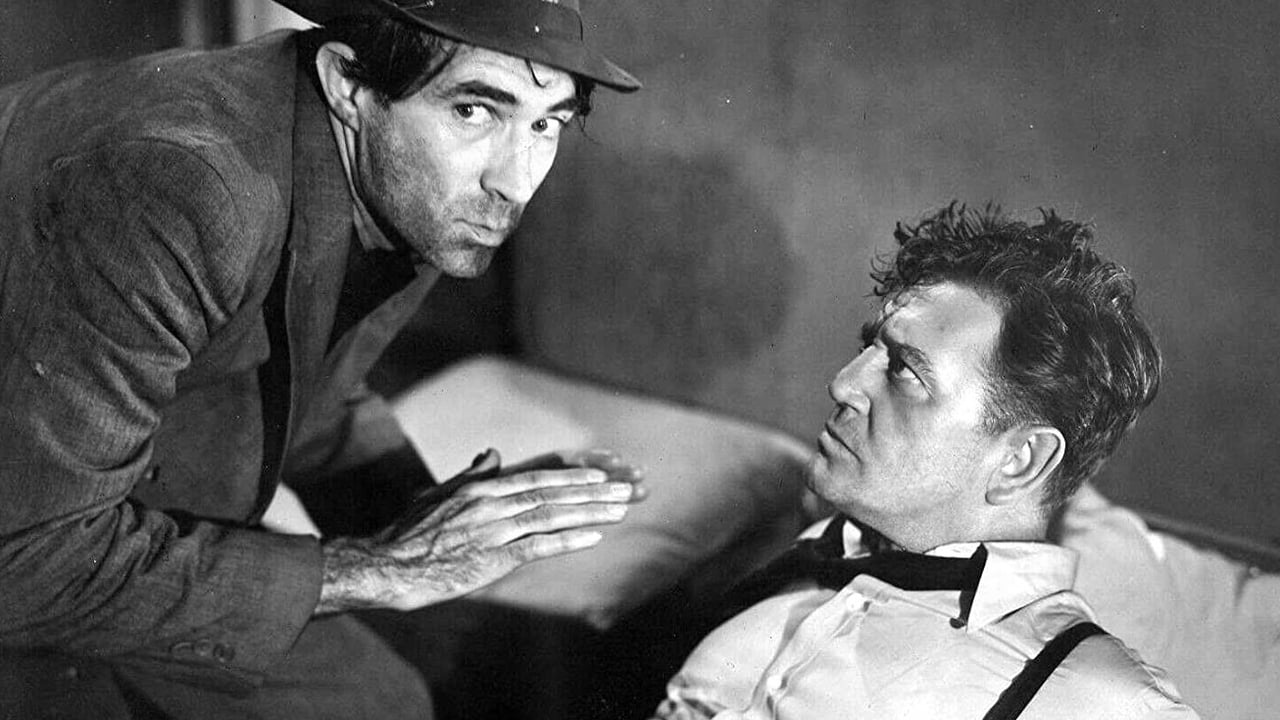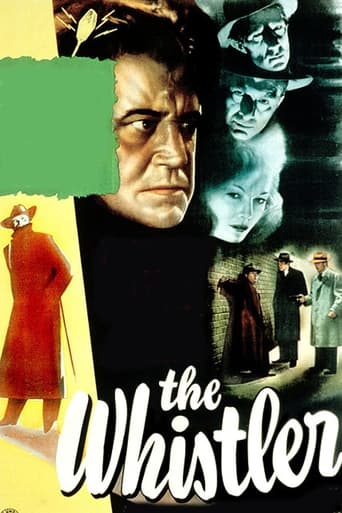


A grieving widower decides that life isn't worth living and arranges for his own murder but ultimately changes his mind to his own detriment. Richard Dix starts off "The Whistler" series literally with a bang, continuing for several more years playing always different characters finding their darkness at dawn. As the war years began to wind down, America found itself in a new crisis: a domestic one not involving enemy agents from other countries or tensions between various parts of the country. This involved individual moralities, pretty much disintegrating as embittered survivors of a depression era world decided to just enjoy life, and to hell with the consequences of their own amoralistic actions. 1944 exploded with such movies, two of them ("Double Indemnity" and "Laura") considered "classics", and others featuring a cynicism that American movies had not previously been allowed to show. Radio got away with it more since the visual aspect of their stories were missing, but with many popular radio shows becoming as American as apple pie, it was only a matter of time before many of them began showing up on the movie screen.In the case of "The Whistler", the mysterious narrator pops in and out of the drama, adding a darkness on-screen that was only psychological on radio. Seeing the dark streets, cynical heroes and world-weary derelicts doing anything just to stay afloat brought the truths of the world out into the open. Dix's character doesn't reveal to the man he pays $1000 to that it is himself he wants bumped off, and later when that man is killed by the police, his widow arranges for a meeting with Dix in order to seek out her own revenge. The hit-man, given the instructions by a deaf mute, follows Dix around with the intention of simply scaring him to death, and when Dix ends up in a homeless shelter, he is almost made a victim of robbery by another homeless man. Every time this film turns another street, more darkness appears, and it is very appropriate that ultimately, it ends up down at the docks of the unnamed city it takes place in.Fans of the 1997 "Titanic" will be intrigued to see a young Gloria Stuart as Dix's devoted secretary, worried about him being missing, while "B" movie favorite Joan Woodbury makes an interesting femme fatal as the widow of the man Dix hired to bump himself off. Billy Benedict, of the "Bowery Boys" movies, is very haunting as the deaf mute (too busy reading the comics to even morally considering what he's passing on), and J. Carroll Naish is quietly sinister as the actual hit-man. Then, there's Charles Wagenheim as the man who tried to pick Dix's pocket in the flophouse who ends up manipulating him into leaving with him only so he can rob him later. This is filled with spooky, unforgettable characters of every dimension of low life, and even the ending is rather a downer, reminding the audience that not every story, whether crime related or not, has to end up happy. It seems that more people end up dead because of this man's grief than what he intended, giving an ironic twist to the darkness of a story that could only be told by "The Whistler".
... View MoreTHE WHISTLER – 1944 This is the first of a series of low budget B films put out by COLUMBIA PICTURES. The series is based on the popular radio series of the same name. One of the hold overs from the radio series is the eerie voice of the narrator giving the viewer various details on the lead characters etc.In this one we have Richard Dix playing a wealthy industrialist type. Dix is rather depressed because of the drowning death of his wife. They had been on a cruise ship that had sunk. Dix decides to end it all and hires a man, Don Costello, to have Dix himself bumped off. Dix tells Costello that it has to happen in the next week, and that he does not want to see it coming. Costello farms out the hit to J. Carroll Naish.Costello then has the bad luck to be killed himself in a shootout with the Police. Dix now gets some rather unexpected news. His wife seems to have survived the ship going down. Dix of course now wants to cancel the hit. His only contact was the now dead as a doornail, Costello. What to do? J. Carroll is a hoot as the killer who keeps getting interrupted every time he goes to hit Dix. Dix discovers that Naish is the hit-man and tries to cancel the contract. Naish however will have nothing to do with cancelling the hit. He was paid, and he will do the hit. He does have a reputation to uphold. The rest of the film has Dix trying to stay one foot ahead of Naish.Not bad for a first try. The series would get better as the teething problems were worked out of the formula.Also in the cast are, Gloria Stuart, Alan Dinehart, Joan Woodbury and Charles Coleman.The director of this 60 minute quickie was, William Castle. Castle would helm three more of the series in the next 2 years. He also made several better than average noir, such as, WHEN STRANGERS MARRY, UNDERTOW, Hollywood STORY, THE FAT MAN, NEW ORLEANS UNCENSORED and JOHNNY STOOL PIGEON.Castle would become a cult favourite with a series of low budget horror-suspense films like, 13 GHOSTS, THE TINGLER, THE OLD DARK HOUSE, STRAIT JACKET, HOMICIDAL, THE NIGHT WALKER, LETS KILL UNCLE, I SAW WHAT YOU DID and THE HOUSE ON HAUNTED HILL.
... View MoreSolid, low-budget film noirish yarn about a man who takes out a contract on himself and then through a reversal of fortune decides against it. The Whisteler open up the film with that delightfully creepy little tune and a brief narrative and the reigns are handed over to a competent corp of character actors(and Richard Dix and Gloria Stuart). Dix plays the lead well-enough though incredibly lethargically. He literally looks like he hasn't slept in days. Stuart is peppy and pretty in a smallish role, but J. Carrol Naish does an outstanding job as the contracted killer. He gives a layered performance is what was a truly difficult role. The film barely spans an hour and ten minutes or so but never lags. we get suspense, action, and answers rather quickly. The Whistler has a much more subdued role then what you would hear in the radio series. This film would go on to spawn many sequels and was one of the earliest directorial forays of horror icon William Castle. Castle, as always, does a more than workmanlike job.
... View MoreThis movie is the first installment of The Whistler series from Columbia Pictures, all but one of which starred Richard Dix whose A-picture career was then on an alcoholic downgrade, but whose liquor-ravaged face was just right for the overall atmosphere. (For a complete list of series titles, consult "movie connections" on web page.) Of all the movie series to emerge from the 30's and 40's, this is easily one of the most fascinating and unusual. Each entry presents a different self-contained story, tied together only by the mysterious figure of The Whistler who comments briefly on plot developments, but appears only in shadow to whistle his trademark refrain. He seems to be a figure of fate since the hand of destiny emerges in most of the entries. But most importantly, the plots follow no formula (unusual for any series) and are entirely unpredictable in their outcome. This unpredictability is what distinguishes the series from others of the time.You really don't know what's going to happen or how each episode will turn out. Moreover, there's a strong noirish quality to many of the entries, with a suspenseful atmosphere, an underlying sense of doom, and imaginative characters and plot twists. All in all, the productions are a first cousin to the celebrated Val Lewton horror cycle from RKO, minus the supernatural. I'm surprised that with all the scholarly interest in film noir, that this noirish series has not received the critical attention it merits.Though weaker in many ways (the script appears put together on the fly), this initial entry contains many features generic to the others. Dix, a prosperous manufacturer, arranges for his own death following the presumed death of his beloved wife, only to find out ironically that she is not dead. The problem is he can't undo the arrangement and is thus forced to escape through the labyrinthine venues of the city's skid row. The entire 60 minutes has something of a nightmarish quality since it starts off with Dix expecting death, though in what form, he can't be sure. Looking convincingly like a real bum, it's Dix's tour through the seedy parts of the city that really commands attention, especially the 25-cent flop-house with its rows of coffin-like cots, snoring vagrants, and sneak thief. You can almost smell the rot-gut whiskey peeling off the walls. The sets are bare-bones, the cafes, bars, and city sidewalks sometimes suggesting the unadorned depths of urban despair. Unfortunately, the ending is abrupt and disappointing. It's almost as though the production suddenly ran out of film and had to wrap it up right then. Nonetheless, many of the distinctive elements of the productions are already present. Unfortunately copies of the series are hard to obtain ( my own burned in a house fire some time ago). So let's hope our friends on cable TV follow up on this initial entry some time soon. It's well worth tuning in.
... View More